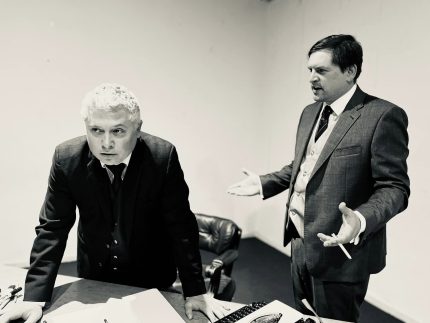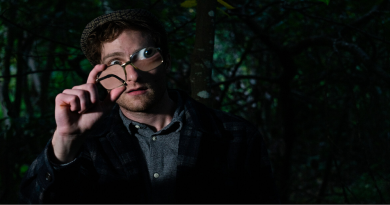Co-Directing with Passion: The Visionaries Behind ‘Ink’
The theatre scene in Adelaide is witnessing a new phenomenon: a fusion of two theatre enthusiasts combining their talents, experiences, and passion to co-direct the upcoming production, ‘Ink’. Rebecca Kemp and Robert Bell, both seasoned contributors to Adelaide’s theatre community, are at the helm of this anticipated production.
‘Ink’, penned by James Graham, delves into the origins of England’s groundbreaking newspaper, The Sun, under the ambitious vision of a young Rupert Murdoch and the relentless pursuit of its first editor, Larry Lamb. Charting the transformation of The Sun from a faltering broadsheet into a media sensation, the narrative unfolds amidst the backdrop of 1969’s Fleet Street. This comedic ensemble drama, which juxtaposes underdog triumphs with Goliath-esque challenges, made waves in London and Broadway, earning two Tony Awards. Now, the critically-acclaimed play premieres in Australia, the homeland of the media titan, Murdoch.
In a recent interview, Rebecca Kemp and Robert Bell shared their insights into their approach to directing the upcoming production of Ink at the University of Adelaide Theatre Guild. Kemp, who has a diverse background in acting, emphasised the importance of creating a fun and enjoyable experience for the cast. She also spoke about the importance of collaboration and working together to find the best way to bring the story to life. Bell, who is making his directorial debut with Ink, reflected on his own journey from actor to director. He spoke about the influence of the Adelaide Theatre Guild on his development as an artist and the importance of considering the unique intimacy of the Little Theatre space. Both Kemp and Bell highlighted the importance of portraying the characters in Ink as genuine human beings, while also acknowledging the creative license that comes with adapting real-world events for the stage.
Rebecca Kemp is a seasoned figure in Adelaide’s theatre scene, known for her versatile roles from UATG’s ‘Seventeen’ to the iconic Lady MacBeth for Independent Theatre. Recent standout performances include Queen Elizabeth in ‘The Audience’ and Margo Channing in ‘All About Eve’. Beyond acting, Rebecca has embraced directing, collaborating with Robert Bell on ‘Pippin’ before solo-directing ‘Guys & Dolls’. Now teaming up with Robert again for ‘Ink’, her dedication to Adelaide’s theatrical community shines brightly.
With a vast and eclectic resume spanning from Shakespearean pieces to contemporary plays, Rebecca has always emphasised the importance of enjoying the creative process. “As community theatre actors/creatives we don’t get paid, people give up their time away from family & friends,” Rebecca states, emphasising the gravity of sacrifice and love actors invest in their craft. With ‘Ink’, she hopes to have provided an environment where “actors enjoy themselves”, which not only aligns with her philosophy but also provides a nurturing space for the actors’ growth.
Rebecca, given your diverse experience in acting, from Shakespearean plays to contemporary pieces, how did that influence your co-directing approach for ‘Ink’?
I’ve worked with many directors as an actor, all of whom have different approaches and I’ve learned so much from all of them. As community theatre actors/creatives we don’t get paid, people give up their time away from family & friends for a substantial amount of time, so the most important thing for me was that our actors enjoy themselves. Yes it’s hard work, and that expectation is there, but if we can’t enjoy creating and collaborating – why would people continue to invest their time in the arts? I hope that I/we have given the actors an enjoyable experience, make them feel valued/trusted and maybe if I’m lucky, shared some knowledge or a different way of thinking they can take into future productions!
Her bond with Robert, a relationship brewed over a decade, plays a pivotal role in this collaboration. The two have a spooky symmetry in their thoughts, leading to a seamless execution of ideas. Their previous collaboration on ‘Pippin’ set the stage, but ‘Ink’ demands a higher level of execution, pushing them both to stretch their creative boundaries. Their mantra? Putting the needs of the show first.
Rebecca, this isn’t the first time you’ve co-directed with Robert Bell, as you’ve previously collaborated on ‘Pippin’. How has your dynamic evolved or changed for this production of ‘Ink’?
Sometimes it’s spooky how alike we think about certain things, but after a decade of friendship we really know each other well. We know how the other person thinks & operates and we leverage each other’s strengths and fill the gaps of the other. Where we differ in approach or style it’s complementary to the other. This time around we had higher expectations from ourselves & each other, we pushed each other because we want the best for this show. I’m really appreciative of the fact that both of us always put the needs of the show first. We both can recognise when something may work better thanks to the other’s suggestion or idea. Best of all we still make each other laugh through the process!
True to their roles, Rebecca and Robert took upon the challenge of representing genuine portrayals in ‘Ink’, a play based on real events and personalities. Their strategy, Rebecca explains, is a delicate balance, focusing on humanising characters with emotions and aspirations while also respecting historical contexts. “At the end of the day – it’s a fictional work loosely based on factual events,” Rebecca asserts, emphasising the importance of theatre for the audience’s sake.
A lot isn’t known about the journalists who worked for The Sun in 1969. Research will only take you to their career progression or highlights. But we wanted to find the balance between making each person be a genuine human being, full of flaws, humour, ambition, greed, insecurities and the like. For Murdoch, the man himself is a bit of an enigma. Even when you read books about him, it’s about what he’s done more than who he is. So for him, we utilised creative licence and went with what worked best for the show. It was much the same for Lamb….who surprisingly is semi-lost to history. This allowed us to work collaboratively with each cast member to find their characters. Robert has the eye for detail & minutiae and I’m more about feel & instinct so together I think that’s supported our cast well. We are blessed to be working with some incredibly talented actors. At the end of the day – it’s a fictional work loosely based on factual events so we have the opportunity to make it work for the sake of theatre and our audience.
For Robert Bell, the play marks a significant chapter in his career. The University of Adelaide Theatre Guild, where Robert made his acting debut, has come full circle as the same venue of his directorial debut. Reflecting on his earlier days, he talks about his awe of fellow actors, the nurturing environment, and the invaluable lessons he learned. Those memories deeply influence his direction for ‘Ink’, taking the play’s setting in the Little Theatre, where performances are more restrained and intimate. This understanding influences how Robert wishes for the audience to feel during the play, with a focus on genuine connections.
Robert, your journey from making an acting debut at the University of Adelaide Theatre Guild to now making a directorial debut for them is fascinating. How has your past experience with the Theatre Guild informed your direction for ‘Ink’?
I remember walking into the first rehearsal of The Pillowman where Bart Csorba and Gary George were acting out an intense scene. I stood in awe of how talented they were. I questioned at that moment whether I was good enough to be in the same show as them, but thankfully throughout the process they both (along with Steve Marvanek) nurtured me, offered me advice, gave me greater insight and made the experience a positively memorable one. Twelve years later I’m directing them in my Adelaide directorial debut. It’s a full circle moment. From that first show onwards, I learnt to always enjoy myself, to ask questions and learn from my fellow actors. In recent years I have taken a back seat from being on stage and focussed on the inner workings, I have been fortunate to have the opportunity to apply those previous lessons and learn from some of Adelaide’s best directors, stage managers and crew members.
Performing in the Little Theatre is a unique experience, you must consider every aspect of the space and remember that the audience completely surrounds you. They are an arm’s length from you on stage, often you can see their faces and their expressions, there is no “playing out” to the audience, it’s more restrained, more intimate. As an actor, your performances tend to feel more genuine in the Little Theatre and as an audience member, you often feel more connected to the actors. This has driven many directorial decisions for Ink by answering the questions “how do we want the audience to feel at this moment”?
Robert’s accolades in the theatre are not just evidence to his prowess as an actor, but they also set the bar for his expectations in ‘Ink’. With a unique blend of prior relationships with many actors in the production and his history of challenging roles, Robert’s direction fuses knowledge and personal experience to guide his cast.
Robert you’ve won awards for your performances in diverse roles. How do those experiences shape your expectations or guidance for the actors in ‘Ink’?
I’ve worked with many of the actors in Ink throughout my journey as a performer in Adelaide. I’ve learnt so much from them and their guidance, but I feel throughout Ink it has been a real example of “you never stop learning”. The actors who guided and nurtured me throughout some of my most challenging roles are welcoming the chance to explore a different way of thinking, or performing. I hold each of the actors in this show to such a high regard, and ultimately that is a testament to their dedication, passion and talent.
Wearing the hat of director comes with new challenges, but having previously worked with many of the cast has assisted in leading them through the process. Having that experience as an actor is such a benefit when it comes to how to approach a scene, how to effectively communicate the motivations or purpose of an action of a character.
In a co-directed venture, the alignment of vision is crucial. For ‘Ink’, the shared journey from 2019 and mutual admiration of each other’s strengths led to a harmonious collaborative environment. Rebecca and Robert’s combined focus remains on the play, leaving ego at the doorstep, and championing their combined vision.
Robert as this is a co-directed play, how did you and Rebecca split responsibilities or merge your visions to ensure a cohesive production for ‘Ink’?
Fortunately, we both think alike a lot of the time. We’ve both been involved in trying to get Ink off the ground together since 2019 and both spent a lot of time discussing, reading and dream casting this show since then. Rebecca and I have known each other approaching a decade in and out of theatre, we know how each other operates. We’re both naturally curious and open minded people, we’re comfortable exploring new ideas and questioning one another and we’re both happy to collaborate with our cast and crew and seek their input. Ultimately, we leave our egos at the door and put the show first.
As ‘Ink’ readies itself for the spotlight, it stands testament not just to the meticulous craft of its directors, but also to the deep-rooted camaraderie, unwavering commitment, and collective vision that both Rebecca Kemp and Robert Bell infuse into the heart of Adelaide’s theatrical landscape.
Season Details
Venue: Little Theatre
Dates:
To book tickets click HERE.




